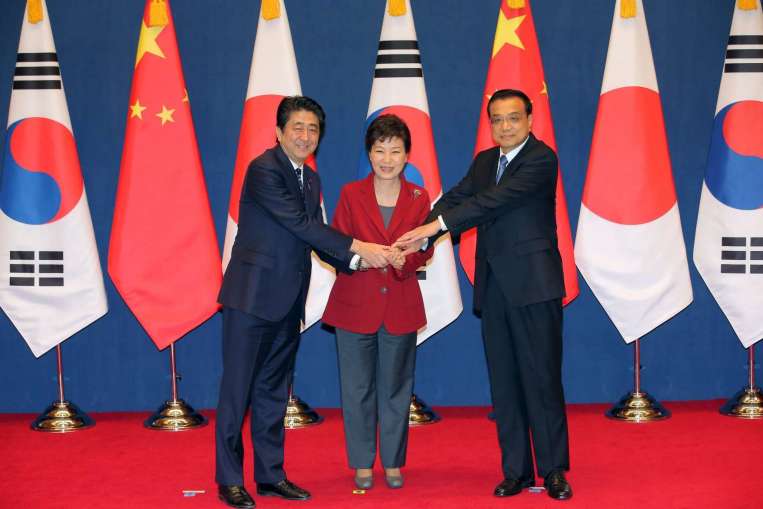SEOUL — Economic integration and cooperative infrastructure development are the way forward for Northeast Asia amid global challenges, delegates from Japan, South Korea and China agreed at a conference here Monday.
Former Japanese Prime Minister Yasuo Fukuda, former South Korean Prime Minister Lee Hong-koo and former Chinese Vice-Premier Zeng Peiyan led delegations of political, business and academic experts at the 10th Northeast Asia Trilateral Forum. The three gave keynote speeches, and attendees held deeper discussions in three conferences: economics and finance; energy and the environment; and culture and education. The two-day event, which ended Monday, was co-sponsored by Nikkei, South Korea’s JoongAng Ilbo and Chinese state media outlet Xinhua.
Banding together
Zeng in his speech called for “the quick conclusion of a trilateral free-trade agreement to tighten economic ties and lay the ground for economic integration in Northeast Asia.” Such a pact would be an engine of regional growth, delegates said. Japanese experts noted that the Trans-Pacific Partnership agreement “will go far in helping the global economy escape long-term stagnation.” South Korean representatives mentioned the country’s ambitions to sign on to the pact.
The Chinese delegation voiced hopes that the TPP would be one of “two organically developing economic blocs” in Northeast Asia, “alongside the Regional Comprehensive Economic Partnership.” China has taken a leading role in RCEP negotiations, which include Japan and South Korea along with 13 other nations.
Joint infrastructure development formed the other half of Zeng’s platform. Integration efforts, he said, would take the form of “networks” and “pathways” of project-based and regulatory cooperation.
Advanced transportation, communications and energy networks are the ultimate goals for joint development: Zeng mentioned undersea tunnels and gas and oil pipelines as possible projects. Shared regulatory, logistics and financial pathways, meanwhile, would create an environment in which those and other efforts could flourish.
Shared standards
That “Three Networks, Three Pathways” proposal echoes the Chinese leadership’s “One Belt, One Road” initiative, comprising transportation infrastructure projects to build land and sea routes between China and Europe. South Korean experts called out that project’s westward bent during Monday’s discussion, worried that China’s Northeast Asian neighbors would be excluded.
Zeng reassured delegates that the “One Belt, One Road” initiative will in fact let the networks and pathways framework “stretch to cover the globe.” Chinese experts also defended the Asian Infrastructure Investment Bank, emphasizing that its goal is to complement rather than upend the current order in international finance.
Proposals for stronger monetary and industrial cooperation also emerged during the discussions. A number of delegates argued for a trilateral currency-swap agreement by the countries’ central banks. Others called on China to use the yuan’s scheduled inclusion in Special Drawing Rights, the International Monetary Fund’s reserve asset, as a chance to make more thorough financial reforms.
Business leaders agreed to embrace network connectivity for all manner of components and devices, the so-called Internet of Things. South Korean delegates proposed that the three countries head the creation of technological standards for networked devices, automobile production and other industries to grow those markets in Asia.
Show of unity
Energy proved to be another timely topic. Trilateral cooperation “would help Japan, China and South Korea lower the costs of natural gas and electricity and maintain stable energy supplies,” said Kim Myung-ja, South Korea’s former environment minister and chairwoman of that meeting.
Japanese delegates called for multinational research into carbon-trading systems and other technologies to address global climate change. Experts from across the world are tackling those issues in Paris, where United Nations climate talks began Monday.
The Japanese delegation urged further study into joint fuel reserves as well.
Chinese delegates supported such efforts between the three key Asian countries, noting the importance of presenting a united front to the world. Cooperating on infrastructure and creating shared fuel stores would help resolve national security risks, they said. Such measures would also help bring down energy costs across the region, which are high relative to those in the U.S. and Europe.
That spirit of unity helped center the conference as a whole. A set of 808 Chinese characters meaningful to all involved became a focal point, representing mutual understanding. An installation consisting of pieces of paper on which the characters were written hung from the ceiling of the central conference hall. JoongAng Ilbo gave out leaflets detailing the glyphs’ varying meanings in Japanese, Chinese and Korean. By promoting those characters’ use at home, countries could foster deeper understanding of their neighbors, those present said.
